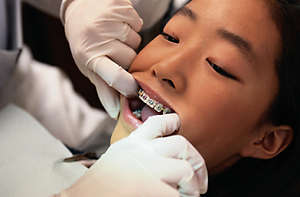
 |
|
 Ginkgo May Increase Gum Disease Thinking of trying an alternative herbal remedy? Be cautious, and before jumping on the herbal products bandwagon, ask your dentist about possible side effects, and report your herbal remedy use to your dentist. Although sales of alternative products reached more than $2.5 billion in 1996 and are growing by 25 percent per year, many patients do not think about notifying their dentist regarding their personal herbal practices, according to a recent study in General Dentistry, the clinical journal of the Academy. "Help prevent harmful drug interactions and adverse oral health symptoms by informing your dentist," says Eric Z. Shapira, DDS, MAGD, spokesperson for the Academy of General Dentistry. "Consumers may not understand how the possible side effects of herbal remedies relate to their oral health." Gingko affects the platelets in the blood stream that cause the clotting mechanism to occur after an injury. Patients taking gingko may bleed through their gums, and the product may cause uncontrollable bleeding or speed up existing gum disease. Bleeding time is prolonged when ginkgo is used with aspirin. Herbal anti-anxiety agents, such as St. John's Wort, may lead to excess sedation when paired with a prescription sedative. Let your dentist know if you are taking herbal or homeopathic remedies and if you are under the supervision of an alternative therapist, advises Dr. Shapira. Alternative Oral Health Remedies**
Do Women Need to Be More Careful With Their Oral Health? Women's oral health depends on their different stages of life. For many women, these changes are directly related to surges in sex hormone levels, such as in puberty, menstruation, pregnancy, lactation and menopause. Women are also more likely to be diagnosed with TMJ, Myofascial pain, eating disorders, and Sjogren's Syndrome (dry mouth). What types of conditions will my dentist watch for? As a woman, you need to adhere to good oral hygiene. Make sure to brush with fluoride toothpaste at least twice a day and after each meal when possible, and floss thoroughly each day. To help avoid problems, your dentist may request to see you more frequently during hormonal surges.
Keep your dentist informed if you experience changes in your oral health or if you are approaching a different life stage. Also, visiting your dentist regularly will help him or her see any physical changes in your mouth. Your dentist should complete a thorough medical history to determine if you are at a higher risk for problems. Shedding Summer Pounds Can Harm Your Teeth With summer just around the corner, many people are dieting and shedding a few pounds before trying on swimsuits and heading to the beach. Actions taken to control your weight may affect more than your suit size, they can put your teeth in danger, reports the Academy of General Dentistry, an organization of general dentists dedicated to continuing dental education. Crash diets, eliminating meat or fatty foods, appetite suppressants and extreme behaviors such as fasting and binging and purging harm teeth. "People need to be aware of how their dieting actions affect their oral health," says Heidi Hausauer, D.D.S., FAGD, spokesperson for the Academy of General Dentistry. Diet pills may decrease salivary flow and cause dry mouth which is devastating to oral health, says Dr. Hausauer. "Fasting can cause a decrease of necessary minerals, including calcium, and anorexia can lead to a deficiency of vitamins and minerals needed to maintain a healthy body and oral health." Diet is an important part of an individual's medical history, and patients should always inform their dentist and physician if they adhere to a diet plan, dieting behavior or undertake drastic dieting actions. |
|
|